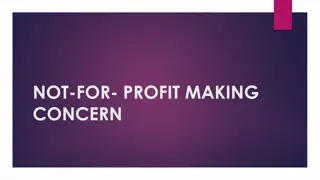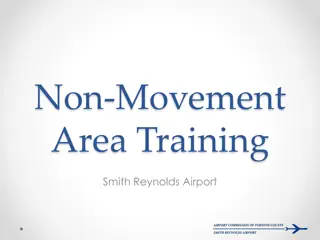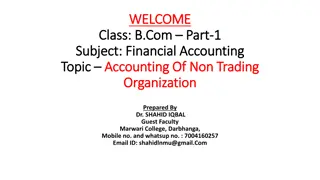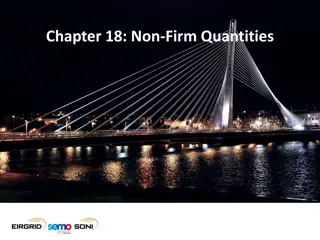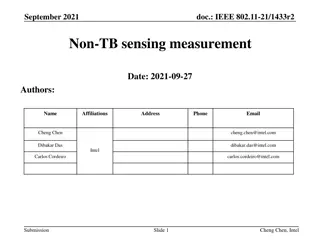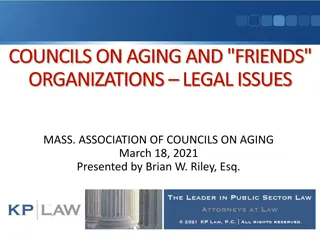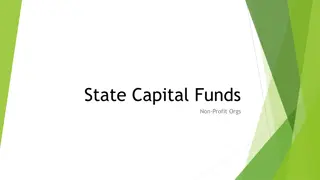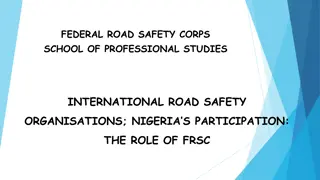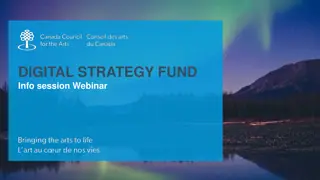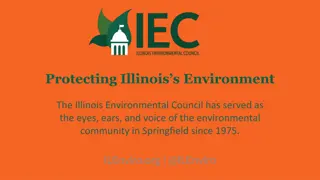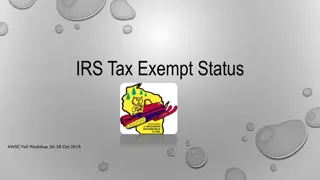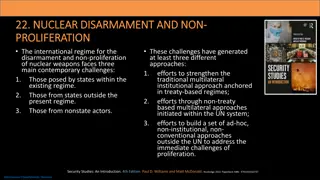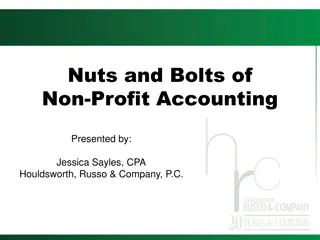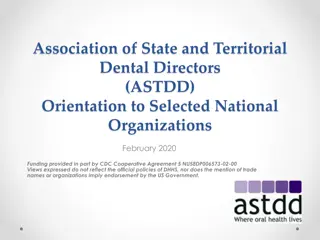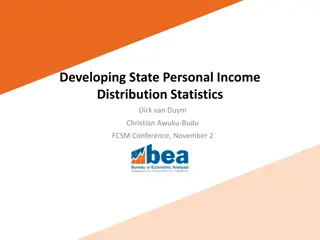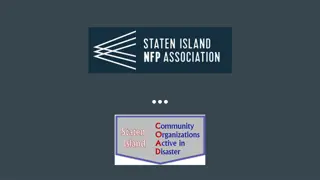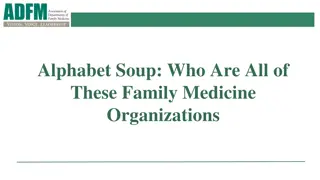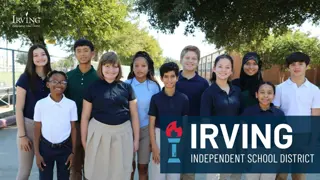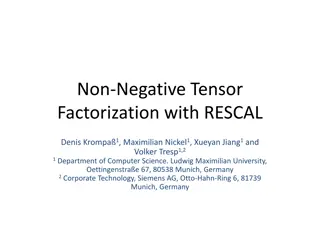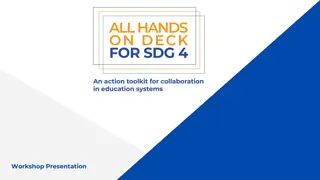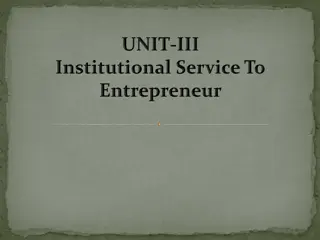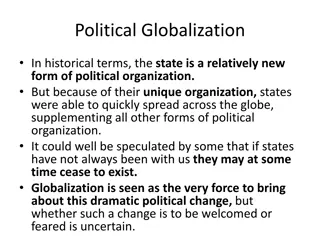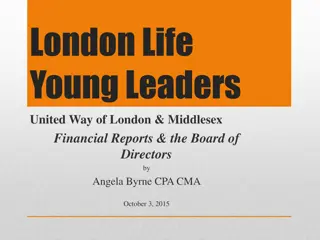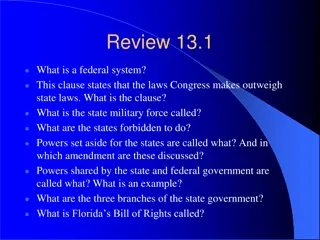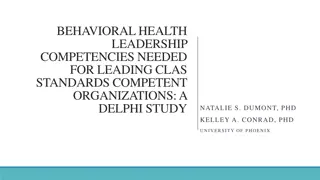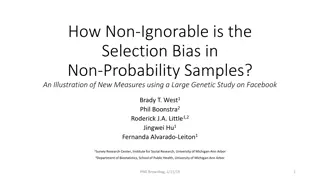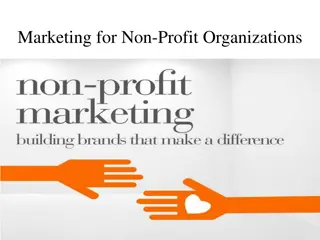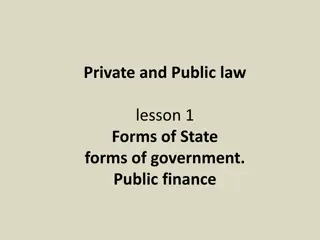NOT-FOR- PROFIT MAKING CONCERN
Not-for-profit organizations, such as educational institutions, public hospitals, and charitable trusts, operate with the main objective of providing services rather than making profits. These organizations rely on various sources of funding like contributions, donations, and grants. Accounting for
4 views • 4 slides
Establishing Safety Standards in Non-Movement Areas at Smith Reynolds Airport
This guide outlines the purpose, definitions, rules, and safety measures for operating vehicles in non-movement areas at Smith Reynolds Airport. It emphasizes standardized ground movement practices to ensure the safety of airport patrons, reduce the risk of injury, and maintain a high level of safet
2 views • 12 slides
Non-Aqueous Solvents: Types and Classification
Inorganic non-aqueous solvents play a crucial role in chemical research and industry. This article by Dr. Princy K.G. delves into the classification of solvents based on protonicity, polarity, and aqueous vs. non-aqueous nature. It explores the types of non-aqueous solvents, such as protonic and non
1 views • 29 slides
The Evolution of Organizations and Blockchain Innovation
The future of organizations is being shaped by innovations in blockchain technology, with DAOs emerging as a major organizational structure. Wyoming has been at the forefront of this revolution, paving the way with blockchain-specific legislation and enabling the growth of Internet-native organizati
2 views • 18 slides
Non-Trading Organizations in Financial Accounting
Non-trading organizations do not aim to profit and provide services without engaging in commercial transactions. Their income sources include donations and grants. Management is handled by committees, and accounting involves principles of double-entry bookkeeping for financial reporting. The main ob
0 views • 8 slides
Non-Firm Quantities in Electricity Markets
Non-Firm Quantities in electricity markets involve units with non-firm access not being compensated for their non-firm capacity not getting accommodated on the system. The concept of Firm Access Quantity plays a key role in determining compensation levels for units, with differences in implementatio
0 views • 6 slides
Non-Compete Agreements: Enforceability and Requirements
Non-compete agreements are commonly used in the United States to protect businesses from competition by former employees. To be enforceable, these agreements must meet certain requirements, including independent consideration, protection of legitimate business interests, and reasonableness in scope,
0 views • 26 slides
Comparison of Trigger-based vs. Non-Trigger-based Sensing Measurement in IEEE 802.11
The document discusses the differences between Trigger-based (TB) and Non-Trigger-based (Non-TB) sensing measurement instances in IEEE 802.11 standards, focusing on who initiates the sensing measurement. TB sensing is initiated by the AP, while Non-TB sensing is initiated by a non-AP STA, enabling o
6 views • 13 slides
Income and Expenditure Account for Non-Trading Organizations
Income and Expenditure Account is crucial for non-trading organizations to monitor revenues, expenses, and financial position. It helps in determining surplus or deficit, providing insights for strategic decisions, and fulfilling reporting requirements for investors and stakeholders. The account is
0 views • 10 slides
Legal and Organizational Guidelines for Councils on Aging and Friends Organizations
This presentation covers legal issues related to Councils on Aging (COAs) and affiliated nonprofit organizations, including topics such as corporate establishment, fundraising, conflict of interest, handling donated funds, and interactions with state divisions. Details on establishing a nonprofit, b
1 views • 14 slides
State Capital Funding Process for Non-Profit Organizations
Explore how State Capital Funds function for non-profit organizations in collaboration with the City, ensuring compliance with State laws for funding release. Learn about the pivotal role of the City's Department of Finance and other important factors in obtaining and utilizing these funds for commu
0 views • 25 slides
Role of FRSC in International Road Safety Organizations
International road safety organizations have become crucial in addressing the global issue of road traffic crashes. This presentation focuses on the Federal Road Safety Corps (FRSC) in Nigeria and its participation in such organizations, highlighting the importance of collaboration for creating a sa
3 views • 25 slides
Digital Strategy Fund Information Session Overview
The Digital Strategy Fund (DSF) aims to support the digital transformation of the arts sector by enhancing digital knowledge, capacity, and citizen engagement. This session covers the purpose of the DSF, eligibility criteria, components, and activities supported. Professional artists, arts professio
0 views • 19 slides
Protecting Illinois's Environment: The Role of Illinois Environmental Council
The Illinois Environmental Council, established in 1975, advocates for environmental issues in Springfield. It represents various organizations, focusing on energy, water, land use, wildlife, and agriculture. With a mission to ensure a healthy environment for all Illinoisans, it collaborates with af
1 views • 17 slides
Overview of Criminal Justice Realignment in California
California's Criminal Justice Realignment, implemented in September 2011, involves shifting custody of certain non-violent, non-serious, non-sex offenders to county control. This initiative also establishes Postrelease Community Supervision and changes the state parole revocation process. The reform
3 views • 58 slides
Guide to IRS Tax Exempt Status Application for Non-Profit Organizations
This comprehensive guide provides essential information on applying for tax-exempt status with the IRS for non-profit organizations. It covers the benefits, application procedures, responsibilities, and tools needed for a successful application process. From determining eligibility to understanding
0 views • 14 slides
Export Marketing and Promotion Organizations in India
Government of India has established various export marketing and promotion organizations since 1951 to assist the export sector. These organizations play a crucial role in promoting and diversifying India's exports by providing services such as advisory functions, information collection, trade deleg
1 views • 9 slides
Contemporary Challenges in Nuclear Disarmament and Non-Proliferation Regime
The international regime for nuclear disarmament and non-proliferation faces challenges from states within and outside the regime, as well as non-state actors. Various approaches are being utilized to address these challenges, including strengthening multilateral institutions, non-treaty-based multi
0 views • 12 slides
Improving Attainment and Progress of Disadvantaged Pupils in Sheffield
Attainment and progress of disadvantaged pupils in Sheffield show an improving trend across key stages, although the gaps between disadvantaged and non-disadvantaged students are not closing fast enough. Data suggests that disadvantaged pupils with low prior attainment are making better progress in
0 views • 29 slides
Non-Profit Accounting Essentials
Learn the basics of non-profit accounting, including what defines a non-profit organization, common types of non-profits, governance structures, and legal responsibilities. Discover key insights on IRS and state requirements for non-profits in this informative presentation by Jessica Sayles, CPA fro
0 views • 55 slides
Further Discussion on Non-primary Channel Access in IEEE 802.11
This contribution delves into the utilization of non-primary channels for access in IEEE 802.11 networks, focusing on enhancing frequency reuse, adhering to ETSI standards, evaluating CCA capability types, and analyzing non-ideal deployment scenarios. It discusses the complexity and benefits of non-
0 views • 26 slides
National Organizations Supporting Oral Health Programs Overview
Explore the partnerships between the Association of State and Territorial Dental Directors (ASTDD) and various national organizations working towards national oral health goals. Learn about resources offered to state oral health programs by organizations like AAPHD, AACDP, National Network for Oral
0 views • 29 slides
Developing State Personal Income Distribution Statistics
This project aims to create a distributional account for State Personal Income, allowing for the analysis of inequality by state and over time. Using various data sources such as BEA aggregates and IRS statistics, the distributional model provides insights into state-level income inequality. Census
0 views • 17 slides
Staten Island Community Organizations Active in Disaster (COAD)
The Staten Island COAD aims to enhance the capacity of non-profits and service organizations on Staten Island to provide support during crises. Through collaboration and communication, various sectors such as hospitals, behavioral health, and social services are represented in the COAD. The committe
0 views • 9 slides
Fiduciary Duties and Ethical Practices in Non-profit Organizations
Explore the key aspects of fiduciary duties, ethical conduct, and the challenges related to embezzlement in non-profit organizations as discussed at the VFW Auxiliary Senior Vice Presidents Conference. Learn about the duty of care, loyalty, and obedience imposed by law, along with important takeaway
0 views • 38 slides
Overview of Family Medicine Organizations and Their Missions
Family medicine organizations such as AAFP, ABFM, ADFM, AFMRD, NAPCRG, and STFM work towards improving healthcare quality, promoting excellence in medical care, advancing family medicine education, and conducting primary care research. These organizations collaborate to enhance patient care, support
0 views • 11 slides
Guidelines for Boosters Clubs: Key Steps for Non-Profit Incorporation and Federal/State Filings
Boosters clubs looking to incorporate as non-profit organizations need to follow specific guidelines for federal and state filings. This involves obtaining tax-exempt status, completing necessary forms for recognition, and adhering to annual filing requirements. Additionally, bylaws must be establis
0 views • 31 slides
Non-Negative Tensor Factorization with RESCAL
This article discusses non-negative tensor factorization with RESCAL, covering topics such as Non-Negative Matrix Factorization, Multiplicative Updates, RESCAL for Relational Learning, and Non-Negative Constraint for RESCAL. It explores how factorizing matrices/tensors into non-negative factors can
0 views • 11 slides
Management Roles in Different Types of Organizations
Management roles vary across different types of organizations, including for-profit, nonprofit, and mutual-benefit organizations. Despite the differences, core management functions such as planning, organizing, leading, and controlling remain essential. Managers in each type focus on specific measur
0 views • 29 slides
Strategic Engagement Workshop for Non-State Organizations
Workshop.Presentation outlining the purpose, agenda, and content of a session focused on supporting non-state organizations in defining their strategies for stronger engagement with the government based on the All Hands On Deck For SDG 4 project. The session covers understanding project learnings, d
1 views • 36 slides
Small Industries Development Organizations in India
Small Industries Development Organizations such as DIC, SIDO, NSIC play crucial roles in overseeing the growth and development of small-scale entrepreneurs in India. These organizations provide a range of services including consultancy, assistance in project identification, registration, raw materia
0 views • 20 slides
The Impact of Globalization on State Sovereignty
Globalization has sparked debates on the decline of state sovereignty as international institutions and interconnectedness challenge traditional state powers. The shift towards a web of organizations raises questions on the future autonomy of states and the effectiveness of violence as a tool. Vital
0 views • 6 slides
Financial Oversight and Accountability in Non-Profit Organizations
Explore the crucial role of fiduciary oversight in maintaining the financial stability and viability of non-profit organizations. Learn about the responsibilities of board directors, including monitoring organizational performance, ensuring sound financial management, and upholding financial account
0 views • 22 slides
Overview of State Government and State Legislatures in Florida
A federal system is a political framework where power is divided between a central government and individual states. In this system, laws created by Congress take precedence over state laws. The supremacy clause enforces this hierarchy. States are prohibited from actions like declaring war or mintin
0 views • 12 slides
Core Leadership Competencies in Behavioral Health for CLAS Standards Competent Organizations
Health disparities in healthcare and mental health organizations are linked to the failure to implement CLAS Standards. This study identifies core leadership competencies required for executive behavioral health leaders to effectively lead CLAS Standards competent organizations. The Delphi study aim
0 views • 17 slides
How Non-Ignorable is the Selection Bias in Non-Probability Samples?
Big Data often derive from non-probability samples, necessitating model-based approaches for inference. Tools to gauge non-ignorable selection bias in descriptive estimates from such samples are lacking. This work aims to address this gap by developing new measures. Building on previous work, the st
0 views • 27 slides
Marketing for Non-Profit Organizations
The study of people's buying behavior, consumer needs, and effective promotional strategies within non-profit organizations. Understanding the differences between marketing approaches of for-profit and non-profit entities, and the various types and orientations of NGOs.
1 views • 9 slides
Key VAT Issues for Non-Profit International Organizations
Introduction to VAT issues faced by non-profit international organizations, including VAT positions, economic activities, exemptions, input VAT recovery, Belgian VAT desk events, VAT implications, subsidies, grants, and more. Learn where to find help and guidance for VAT reviews, compliance, and cro
0 views • 12 slides
Origins of the Modern State and State Fragility
Delve into the concept of the modern state, exploring its origins, the role of coercion and physical force in governance, the idea of nation-states, and the spectrum of state effectiveness. Understand the social contract view of the state, consider state fragility in 2023, and ponder the state of na
0 views • 92 slides
Forms of State and Government Overview
This content provides an insightful look into different forms of state and government, including the main features of a state, various forms of state like feudal society, socialist state, and welfare state, centralised versus decentralised state structures, and examples such as the Italian Constitut
0 views • 31 slides
